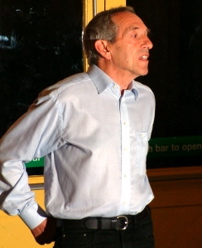
Daniel Glaser introduced Mayer, reminding us of his seminal papers: in 1991 One false move…A Study of Children’s Independent Mobility, which alerted people to the effect of traffic on children’s independence; and his 1993 paper: Cycle helmet, friend or foe.
Mayer said after the talk that “I think that the report that the BMA commissioned me to write in 1992 and published in its name (Cycling towards health and safety)was far more influential that the helmet report.”
Mayer then introduced himself, saying that Colin Buchanan’s report Traffic in Towns caused him to stop being an architect and to write a doctoral thesis against the assumptions in the Buchanan Report. Mayer’s new book is called How we can save the Planet, but he would have preferred to call it As if there’s no tomorrow or Eyes wide shut or even How we must save the planet.
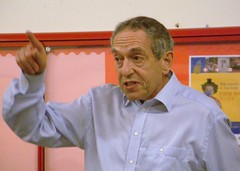
Mayer warned us that our planet has a finite capacity for absorbing greenhouse gases and that the seriousness of the current situation is emphasised by the recent incidence of floods, hurricanes, big waves and icecap melting. And that 160,000 extra people died in third world and 20,000 in Europe due to climate last year. All of these changes are attributable to human activity. Mayer emphasised often during the talk that carbon rationing is the only way forward and that equal shares is the only fair way. The ration will have to go down each year. Up to now, our criterion of success was growth in GDP and that people should travel further and faster and be provided with low cost airlines. However, now that we all more or less know what the consequences of our actions are, we can no longer go on behaving in this way unwittingly.
Mayer outlined peoples’ responses to the situation, for example they think there might be a technological solution or they make excuses such as others are far worse.
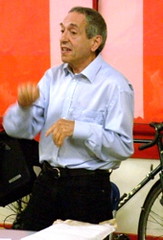
Mayer emphasised the exponential rate of growth of carbon dioxide (CO2) in the atmosphere from 280 parts per million (ppm) before the industrial revolution to 370ppm now. The concentration had been the same for half a million years until the industrial revolution. Blair will be speaking about the issue of CO2 emissions this week. The government’s target of 60% reduction of emissions by 2050 is inadequate – we can’t wait until 2050. Their ceiling of 550ppm is too high. If the issue of equal shares is brought in, we need a reduction of 90% in 20-25 years, based on 10% per annum and diminishing returns, We have a responsibility to our children and grandchildren to protect the environment.
Mayer discussed the other options including carbon sequestration and the use of alternative fuels/energy sources. However, these could make only a small contribution.
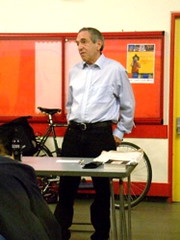
The only realistic solution is to introduce carbon rationing. The average CO2 emission in the UK is currently 10 tonnes per person, and this needs to be reduced to a little over one tonne within 20-25 years. A rationing scheme should use the principle of contraction and convergence – contraction of greenhouse gases and convergence to equal rations. The archbishop of Canterbury has supported this principle. It is not a matter of making personal sacrifices – rationing must be imposed by the government. Mayer believes we will have rationing within a few years; the initial ration should be introduced at the current national average and then decreased each year to the necessary level. Trading will be allowed, thereby encouraging energy thrift and costs will depend on demand and availability. A flight from London to New York would be three year’s ration. Tourism would change and the Olympic Games would no longer be possible.
This is where cycling comes in – many more will choose to cycle. The carbon costs of motorised transport will rule it out. People will become carbon literate. Mayer says it is hard luck if you can’t travel. Entrepreneurs will work on renewable power and on home insulation schemes. If we don’t accept equal rations then others will get less and we will wittingly destroy the planet. 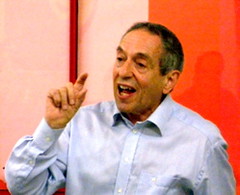
Issues that came up during the discussion:
Mayer makes much of the analogy with food rationing during the second world war, but then people had good reason to expect that it would end; nor were rations progressively ratcheted down. The carbon rationing he proposes is much more drastic.
The need for popular support for rationing, but Mayer has concentrated on support in the Commons.
The need for initiatives globally and in the EU, Mayer: Blair will be president of EU and G8 next year and promised an agenda on climate change. Chirac supports contraction and convergence. China is improving productivity without our level of use of fossil fuels.
The use of energy conservation, wave power. Mayer said that due to the cost of technology it would be impossible to deploy it in time.
Nuclear power. Mayer rules out on security and moral grounds – its effect on future generations.
Carbon trading – initial cost in EU will be 70 euros per tonne, which is unrealistic, Mayer says price will be determined by supply and demand – no need to fix a price.
Carbon figures for various forms of transport in the book are calculated from average occupancy. It would not improve matters to get more people to fill the empty seats in trains. Moving from car to rail is not the point, cycling or walking should be considered. Don’t fly to Paris. Longer journeys do more damage.
Will individuals have equal rations (some people can’t cycle). Mayer – excuses will go on and on – rations should be equal.
Use of email as an alternative to making visits. Mayer has opened conferences electronically, both by a satellite link up and by video.
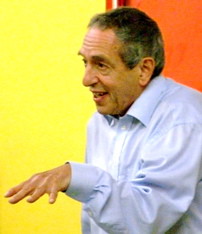
Is there any point in stopping cheap flights? Are half measures any point in terms both of cutting carbon emissions and of getting people to take the issue seriously?
Finally, Mayer said there should be no half measures they are just a way of not facing up to reality – there’s no time for consensus building.
How We Can Save the Planet by Mayer Hillman with Tina Fawcett is published by Penguin, priced £7.99.


